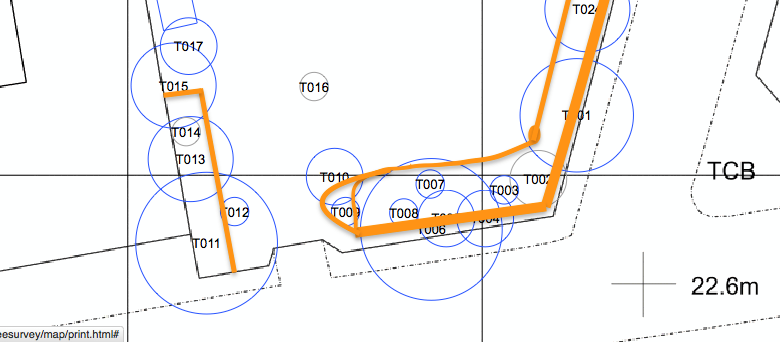
What are Arboricultural Planning Services?
On developments where trees are to be affected by works, arboricultural services usually consist of three stages:
Stage 1 Site Survey and a Tree Constraints Plan (TCP): Identifies and evaluates the trees on site following the BS5837:2012 standard.
Stage 2 Arboricultural Implication Assessment (AIA): Provides a tree protection plan that summarises the tree work to be undertaken and identifying those trees that are to be removed and/or retained, how the tree root zones will be affected, and how trees to be retained will be protected during construction.
Stage 3 Arboricultural Method Statement: Details how works will be carried out while protecting the trees, in accordance to the BS3998 standards.
When Do I Need To Get In Touch?
If your site has trees and you are planning to construct or redevelop the site in some way, you will likely need a Stage 1 Tree Survey (often referred to as a BS5837 survey). By carrying this out early on, ideally before the design stage, delays and extras costs can be avoided.
Trees are a valuable asset that need to be monitored and preserved. When calling on the services of a professional arboriculturist, there are several points to remember:
- The owner of trees has a legal duty of care to have their trees regularly checked (more thoroughly if they are located in high risk areas).
- All trees have a monetary value in addition to their amenity and wildlife value. Depending on the method used to calculate the value, it can amount to tens of thousands of pounds for each tree. Most developments increase value and improve appearance by incorporating good tree specimens.
- Wildlife and planning laws gives protection to trees. It is imperative that the owner is aware of any restrictions to work on trees eg Tree Preservation Orders (TPOs), felling licences, or those in a Conservation Area.
How can EcoNorth Help Me?
Our in-house Arboriculturist can advise you on the requirements of your development and trees and deliver all three stages of assessment if required. In order to integrate the arboricultural surveys into the development process as smoothly as possible, our Arboriculturist suggests the following process:
- Well in advance of submission to the local planning authority, undertake a topographical land survey so that the location of the trees can then be accurately plotted.
- Ideally, prior to any development plans being drawn up, our arboriculturist will undertake stage 1 of the survey (a site survey and TCP) so that high value trees can be incorporated into the design and given enough room to develop. Lower category trees can be removed if needed. Dangerous and unhealthy trees should be removed.
- After the design stage, Stage 2, an AIA summarises and advises on the implications of the tree work required.
- Finally, Stage 3, an arboricultural method statement is done once the survey has identified any possible constraints. The method statement will provide clear guidance on how to carry out works while adhering to wildlife legislation and policy.

